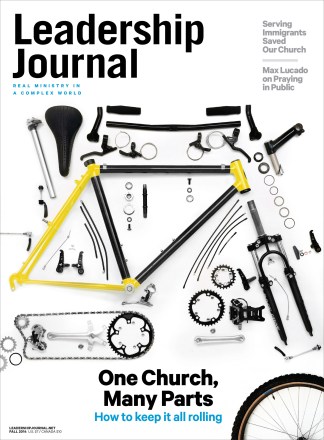My wife and I never felt "called" to be foster parents, at least not the way people usually describe these things. No eureka moment or voice from above. School, work, and relationships had exposed us to the need (about 400,000 children in the U.S. foster care system, roughly 100,000 of them are waiting to be adopted). Scripture told us this is the sort of thing Christians do (Deut. 24:17-22; James 1:27). So when we realized we were able, we decided we should be willing. Then we waited.
In fact, we waited for nearly a decade. Why?
We waited because we knew we couldn't do it alone. We were acquainted with the demands of fostering, and we knew we couldn't do it—not well at least—without a lot of help. Every child needs a community of nurture, support, and discipline that extends beyond their immediate family. How much more does that apply to children who have experienced the trauma of being removed from their home for their own protection? Unfortunately the church we attended seemed unwilling to help us shoulder so great a responsibility. So we waited, stranded between desire and ability.
Mission Made Impossible
Too often the story ends here. We read Scripture, we desire to obey, but we have no idea how. So we throw up our hands in exasperation and exclaim, "This stuff is impossible! I can't love that enemy. I can't minister to these prisoners. I can't take widows or orphans into my home." Perhaps we are even tempted to think that these commands were never meant to be obeyed.
Think, for example, how many sermons spend the first 10 minutes explaining what Christ taught, and the next 15 reassuring the congregation it doesn't apply to them? "Now we've got to use moderation and common sense here … obviously, this will look different for everyone … what really matters is if your heart is right."
Often we spend so much time on why Scripture's commands don't apply to us as individuals that we don't consider new Spirit-inspired ways of obeying together.
The trouble isn't with Scripture's commands or Christ's teachings. The trouble is with us. Having drunk our culture's individualism to the dregs, it rarely occurs to us that there is any way of obeying Scripture other than alone. And by ourselves Scripture really is impossible to obey.
Obeying Together
Thank goodness, then, that we were never meant to obey all by ourselves. The Scriptures—the histories, the songs, the prophecies, and the letters that make them up—were written for communities. They were read in communities and they were meant to be lived out in communities (Mark 10:29-30). This is why we pray to "Our Father who art in heaven." Not my father. And we beseech him for "our daily bread."
Christianity is an adventure far too big to complete alone. In order to faithfully and consistently follow Christ we need the emotional, material, and spiritual support of a community much larger than our biological family; we need the church. Only there do we find the Spirit-inspired imagination to live out Christ's directions together.
That's how it was with us. Thankfully, in time we found ourselves surrounded by Christians who were willing to share the responsibility of children with us, and so we began taking in foster children. One was eight-year-old Adrian. Our brothers and sisters in Christ were his aunts, uncles, grandmas, and grandpas. They played with him, prayed with him, disciplined him, and discipled him. They took him fishing and helped him with homework. Most of all they made a point to be present in our home and at our table.
My wife and I know we're not saints. We are imperfect people who rely heavily on the body of Christ.
We needed every ounce of the help we got. Adrian was 300 pounds of anger, fear, and defiance packed into a 45-pound package. Frankly, caring for him alone would have exceeded our mental, emotional, and physical capabilities. Without help I have no doubt we would have given up on the foster care system. Worse still—I wince at writing this—we would have given up on Adrian.
We simply couldn't have done it alone, not in a way that was either healthy or sustainable. But in Christian community we gained a reservoir of resources that provided us the endurance to prove to this child what he had learned not to believe: that there is a love that will not give up on him.
Adopting Together
Then, after nearly a year with us, Adrian's biological mom unexpectedly decided to rescind her custody rights. Suddenly Adrian and four of his siblings needed a permanent home. Though this wasn't what we planned, we couldn't imagine not adopting Adrian. But what about his four siblings? We never imagined having that many kids—just the one was plenty. Still, how could we love this child without loving his siblings as well? How could we provide him security while leaving his brother and sisters in the wind? Once again, desire and ability were at odds.
We gathered our closest Christian friends, those who had already helped us so much with Adrian, and asked if they would share this also. "Would you adopt these children with us?" They said yes, and they promised they would stand by us no matter what came. Because of that promise, we could promise our children that we would stick with them no matter their trials or troubles.
We also stood in front of our larger church body and asked for help. The vast majority were wonderfully supportive. They encouraged us to do it, and they provided tremendous help. But others were not so enthusiastic. Some, though not to our faces, said it was irresponsible. "Nothing personal, but you can't parent these five kids well. That's more than anyone can handle." On the other end of the spectrum, some said we were saints for even considering it.
We knew better. We knew that adopting these children was not impossible or irresponsible. But neither was it especially heroic. It was none of these things because we weren't doing it alone. When we obey together we happily resign the mythical ideals of the saint, the hero, the exceptional individual, and in their place we insert the living, breathing body of Christ.
You see, in the body of Christ it was possible for us to do what we felt called to do, indeed what Scripture called us to do, but what we were utterly helpless to do by ourselves. The community called church made it possible for us to obey.
Raising Christians Together
With tremendous gratitude I can report these Christians have been true to their word. I would like to celebrate everything they have done for us, but space allows only a few examples.
Because of their promise numerous friends have found housing nearby our family. They take it that seriously. One couple even moved across the street.
Because of their promise members of our church have spent hours helping our kids catch up in school—no small thing when you have four kids between 7th and 11th grade who previously completed schoolwork only when they were in the mood (which, as you might guess, was not often).
When it became clear that some of our children needed to be home-schooled—something we'd never imagined doing—this community of believers once again filled in where my wife and I fell short. A science teacher dissected animals; a math teacher explained algebra; musicians taught guitar and piano; one computer programmer taught the kids how to create a digital game of ping pong.
Most important of all, because of their promise, brothers and sisters have nurtured my children in the faith. I'm not embarrassed to say that my kids do not always sit by my wife and me at church. They sit beside other adults they admire. My children study how they worship; they watch them pray; they read Scripture from a shared Bible; and they spy the notes they take on the sermon. By watching and mimicking they learn how to be Christians.
Besides this, different ones have taken it upon themselves to meet weekly with our older children to disciple them. These times together—running an errand with some advice along the way or a weekly walk full of thoughtful questions—might seem like no big deal. In fact, they are an invaluable gift, particularly during the teenage years when parents—largely by virtue of being parents—are by definition not cool. How wonderful, how absolutely essential really, to have adults we trust, and that the kids admire, who reiterate the exact beliefs and values we teach at home.
No Saints Allowed
My wife and I know we're not saints. We are very imperfect parents who rely heavily on the body of Christ. And isn't that how it's supposed to work? We can't all adopt, but we are all called to care for orphans. We can't all take in the homeless, but we are all called to clothe the naked, feed the hungry, and provide clothes and shelter for those who are cold. In the church this is possible because in the church everyone contributes to everyone else's obedience.
In other words, when I bring my kids to church they are everyone's problem, in the best possible sense. In the same way, when my friend Cameron brings someone who's been living on the streets of Knoxville, that person is everyone's concern. This is a relief for Cameron and an opportunity for me to participate in his obedience.
Here the glory shines where it should, on Christ and his church. Why should we claim the glory for ourselves? Alone we are helpless to obey. It is only in the Spirit-filled community called church that we are made able.
No, there are no saints here, not unless you include everyone.
Jason Johansen is co-pastor at Grace and Peace Church in Knoxville, Tennessee.
Copyright © 2014 by the author or Christianity Today/Leadership Journal. Click here for reprint information on Leadership Journal.










